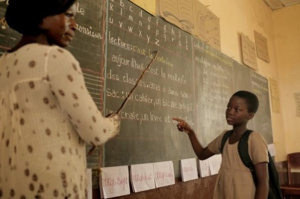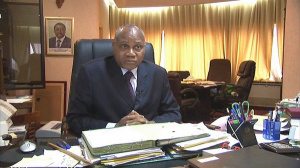Togo First
Togo: Government Launches Contest to Recruit over 4,000 Teachers
The Togolese Ministry of Labor recruits new competent teachers to bolster the education sector. On September 5, 2024, the ministry announced a national contest to recruit 4,386 state teachers.
Applications will be accepted from September 9 to November 7, 2024, at regional education departments and regional technical education and vocational training inspectorates. Applicants, Togolese men and women, must be at least 18 and no more than 40. Selected candidates will pass written tests on December 7 at examination centers in Lomé, Tsévié, Atakpamé, Kpalimé, Sokodé, Kara, and Dapaong.
Of the selected candidates, 850 will be assigned to preschool, 1,680 to primary, 824 to lower secondary, 676 to upper secondary, and 356 to technical and vocational education.
Details on participation conditions, job distribution, and application procedures are available in the national daily Togo Presse.
Esaïe Edoh
Togo strengthens security protocol after Port of Lomé’s fire
A fire broke out at the Port of Lomé on September 5, damaging three coasters, one of which sank. The incident occurred around 9 a.m. in the area where small coasters and tugs are usually parked.
In response, the Port Authority announced plans to increase safety measures. Regular inspections and checks will be conducted to ensure fire-fighting equipment is operational. Economic operators at the port are also urged to follow safety standards and equip themselves with necessary fire prevention devices.
Rear-Admiral Fogan Adegnon, Managing Director of the Port Autonome de Lomé, stated that fire simulations will be organized as part of each structure's Operational Response Plan to improve readiness for future incidents.
Ayi Renaud Dossavi
Lomé Airport Boosts Togo’s Non-Tax Revenues in Q1 2024
Togo’s non-tax revenues rose to CFA12.38 billion in Q1 2024, up from CFA4.90 billion in Q1 2023 (+152.65%). The Lomé airport significantly contributed to the boom.
Recent data from the Budget and Finance Department shows that the airport paid the Treasury CFA5 billion in fees for rehabilitation works, twice the sum the State expected. The fees made up 40% of non-tax revenues collected between January and March 2024.
During this period, the airport welcomed 325,709 passengers, against 305,515, or 6% more than, in Q1 2023.
This year, Togo expects its non-tax revenues to stand at CFA61.97 billion. Thus, the sum generated in Q1 makes up 19.98% of the target.
Esaïe Edoh
Togo: Exports Revenues Reached CFA422 Billion in H1 2024
Togolese earned CFA422 billion from exports throughout the first half of the year. According to the country’s Institute of Statistics (INSEED), the figure is down 0.9% year-on-year (CFA426 billion.
During the six months ended in June 2024, export revenues were the highest in March, standing at CFA81.3 billion. They stood at CFA63.8 billion and CFA64.6 billion in January and February, respectively.
After peaking in March, exports fell to CFA79.3 billion in April, then further to CFA59.7 billion in May, the lowest in H1 2024. However, they rose back to CFA73.1 billion in June.
Togo’s import revenues stood at CFA921 billion over the period reviewed, resulting in a trade balance deficit of nearly CFA499 billion. The gap spread a little compared to H1 2023 where it stood at CFA495.4 billion.
Quarterly, Togo’s exports totaled CFA209.8 billion and CFA212.1 billion in Q1 and Q2 2024, respectively. Imports decreased by 3.1%, from CFA467.7 billion in Q1 to CFA453.2 billion in Q2.
Togo's main exports include phosphates, which generated CFA39.6 billion in Q2 2024, or 18.7% of all export revenues. Other key exports are plastic bags (8.6%) and petroleum oils (8.5%). In Q1, plastic bags made up 11.4% of exports (CFA23.8 billion), followed by phosphates (CFA22.6 billion, 10.8%) and petroleum oils (CFA22.5 billion, 10.7%).
Ayi Renaud Dossavi
Togo Launches Program Budget Training Workshop for Decentralization Ministry Top Brass
Members of the Decentralization Ministry’s top brass are participating in a training workshop on program budgeting. The workshop, which began on September 3, 2024, in Kpalimé, ends on September 8. It is part of an initiative to build capacity for preparing program budgets for the 2025 fiscal year.
The goal is to help the ministry’s workers understand the steps necessary to set up a program budget. The workshop will cover topics such as gathering preliminary information for the multi-year expenditure programming document for 2025-2027.
Participants will also learn about decentralizing the authorizing officer's role to give local administrations more control over financial resources. The training will cover budget transfers, program reviews, and types of expenditures in a program budget.
This workshop is supported by the Decentralization and Good Governance Phase IV Program (ProDeG-IV) of the German Development Cooperation (GIZ) and aligns with the Togolese government's structural reforms. Since 2020, Togo has implemented program budgeting in line with WAEMU directives, moving away from traditional means-based budgeting. This has improved to use of funds to achieve the government’s development goals.
Esaïe Edoh
Togo: Heidelberg Materials Announces New Investments
German Group Heidelberg Material (formerly known as HeidelbergCement) is planning new investments in Togo, where it already operates through its subsidiaries SCANTOGO, GRANUTOGO, and CIMTOGO.
On September 3, 2024, Hakan Gurdal, the Group's Managing Director for Africa, the Mediterranean, and West Asia, announced these plans during a meeting with Togo's Prime Minister, Victoire Tomégah-Dogbé, in Lomé.
The new investments will focus on the environmental and industrial sectors, funding sustainable solutions in cement production using alternative materials. The Group aims to produce zero-carbon cement as part of its commitment to environmental sustainability.
Discussions with relevant ministries are already underway, and Gurdal noted that these efforts will be expedited with the Prime Minister's direct involvement.
Heidelberg Materials has been active in Togo for several years, with an investment portfolio of €400 million (about CFA262 billion) through its three subsidiaries. The company is a major player in the cement sector, employing over 1,000 people in Togo through SCANTOGO (which produces clinker); GRANUTOGO, a gravel crushing unit; and CIMTOGO (a cement plant).
Esaïe Edoh
Togo Aims for More Women in Public Finance Auditing
Togo's Court of Auditors is pushing for greater female representation in public finance audit bodies, to achieve 30% women among financial magistrates and inspectors by 2025.
The Court highlighted significant gender imbalances in these institutions. Currently, only one out of 20 magistrates at the Court of Auditors is a woman. At the Inspectorate General of the Treasury (IGT), all five officers are men, while at the Inspectorate General of Finance (IGF), just two of the ten officers are women. The General State Inspectorate (GSI) is the only body with gender parity, having five women out of ten inspectors.
Based on these findings and the Court's new organic law, the institution emphasizes the need to strengthen the female workforce in key agencies like the IGT and IGF. The aim is to promote more gender-sensitive management of public finances.
Tchakéi Essowavana, president of the Court of Auditors' 3rd chamber, stressed the importance of having competent women and men in these audit bodies. This initiative was launched at an August 30, 2024 symposium in Lomé, organized in collaboration with the German development agency GIZ.
Togo and Haier Group Sign MoU in Health and Energy Sectors at FOCAC 2024
Togo is expanding its partnerships on the sidelines of the 9th China-Africa Economic Forum (FOCAC 2024) in China. The Togolese delegation, led by President Faure Essozimna Gnassingbé, signed a memorandum of understanding (MOU) with the Haier Group, a global leader in household appliances, health, and energy.
The MoU, which covers the health and energy sectors, comes as Togo continues efforts to attract investment in these strategic areas. It was signed by Togolese Ministers Manuella Santos (Industry) and Robert Koffi Eklo (Energy).
Present in many African countries, Haier Group wants to reinforce its footprint in Togo by providing innovative solutions in biomedical cold chain management, hospital equipment, and renewable energies. With 117 factories in 160 countries, Haier is the world's leading provider of solutions for better living and digital transformation. The group is a globally recognized expert in household appliances, biomedical cold chains, laboratory and hospital equipment, blood transfusion center supplies, renewable energy, banking and finance, infrastructure, and education and training.
Togo: Ministry of Trade Strenghtens Capacities of Small and Medium Businesses during Two-Day Worskshop
Several heads of Togolese Micro, Small, and Medium Enterprises (MSMEs) recently participated in a two-day workshop to boost their capacities. Ended on September 4, the meeting was organized by the Ministry of Trade and Local Consumption.
Around 30 leaders, including members from the Togolese Group of SMEs, the FAIEJ, and the Togo Chamber of Commerce and Industry, took part in the workshop. Discussions focused on crucial topics such as accessing financing, managing human resources, and finding strategic partnerships.
Chaired by Comlan Nomadoli Yakpey, Secretary General of the Ministry, the workshop aligns with the government's Roadmap 2020-2025 reforms. These reforms aim to support MSMEs through a new charter and the creation of the SME Development Agency.
"In today's ever-changing business landscape, the ability to forge strong partnerships is more important than ever. Partnerships are more than just transactions; they are strategic alliances that, when well-managed, can bring mutual benefits and propel companies to new heights," Yakpey said at the opening.
The recent workshop and similar initiatives reflect the government's commitment to enhancing the capacities of small and medium-sized businesses, as they are key drivers of innovation and economic growth.
Ayi Renaud Dossavi
Togo Extends Registration Deadline for Coffee and Cocoa Marketing Season
The Coordination Committee for Coffee and Cocoa Sectors (CCFCC) has extended the registration deadline for the 2024-2025 coffee and cocoa marketing season. The new deadline is September 16, instead of August 30.
The CCFCC has also urged operators with incomplete applications to finalize their documents before the new deadline.
Approved cocoa and coffee exporters for the upcoming campaign will be announced after this period. This move comes as coffee and cocoa exports have been rising, with the 2022-2023 marketing year seeing exports of 3,500 tonnes for coffee and 9,000 tonnes for cocoa, reflecting increases of 9% and 63%, respectively.
Ayi Renaud Dossavi










